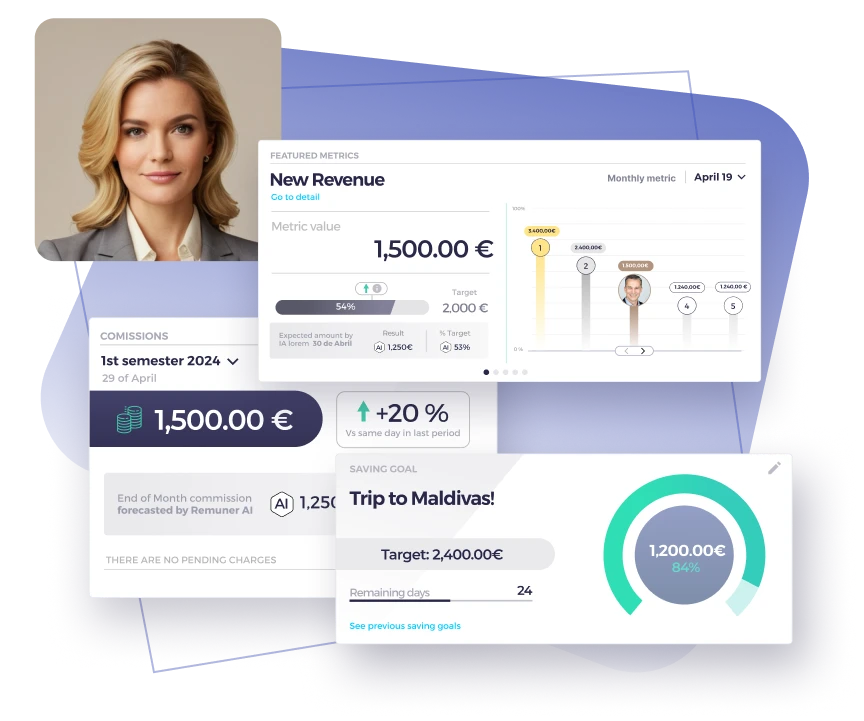Table of contents
Sales comp plans are essential tools for aligning business goals with team performance. These plans outline how sales professionals earn compensation beyond their base salary, often by achieving specific targets such as closing deals or meeting a sales quota.
The right sales comp plan not only motivates reps but also drives business outcomes like revenue growth and profit margin optimization. Let’s explore how to create and implement effective sales compensation plans that enhance sales performance and attract high-performing talent.
What Are Sales Comp Plans?
Sales comp plans, or sales compensation plans, detail how a company rewards its sales team for achieving sales targets. These plans often include a combination of salary plus commission, bonuses, and other sales incentives. An effective plan aligns with the company’s goals, products or services, and overall sales strategy.
Types of Sales Compensation Plans
Straight Commission: This commission-based plan rewards sales reps solely based on the deals they close. It’s ideal for organizations focused on high sales targets but may lack financial stability for employees.
- Example: A real estate agent earns 5% of each property’s sale price.
Salary Plus Commission: Combines a base salary with commission, offering financial security and performance-based rewards.
- Example: A software sales rep earns a $50,000 base salary plus 10% commission on deals exceeding their $500,000 annual quota.
Tiered Commission Structure: Reps earn higher commission rates as they surpass certain sales targets. This encourages continuous performance improvement.
- Example: 5% commission for the first $100,000 in sales, increasing to 10% after reaching $200,000.
Revenue-Based Plan: Rewards sales professionals based on the revenue generated, often tied to high-margin products or services.
- Example: A salesperson receives 15% commission for every premium subscription sold.
Profit-Margin-Focused Plan: Incentivizes reps to sell high-margin products, aligning their efforts with company profitability.
- Example: A sales rep earns bonuses for selling luxury items with a profit margin exceeding 30%.
Why Sales Comp Plans Matter
Effective sales compensation plans directly impact sales performance by motivating reps to align their efforts with company goals. Here’s how:
- Encourage Better Sales: A good plan pushes reps to focus on the right goals.
- Attract Great Talent: Clear and fair pay plans bring in top salespeople.
- Boost Productivity: Motivated teams sell more and work harder.
- Support Business Goals: Plans tied to company goals make sure everyone is work
Well-designed comp plans also reduce turnover. Salespeople who feel valued and fairly compensated are more likely to stay with a company. This saves money on hiring and training new staff.
Steps To Design A Sales Comp Plan
Creating a good sales comp plan doesn’t have to be hard. Follow these steps:
- Know Your Goals: What do you want to achieve? Is it more revenue, better profits, or a stronger market presence?
- If your goal is revenue growth, focus on commissions tied to total sales.
- For profit margin improvements, reward reps for selling high-margin products.
- Set Targets: Decide on sales quotas that match your goals. Make them realistic but challenging.
- Use past sales data to set benchmarks.
- Avoid setting quotas too high or too low.
- Pick The Right Plan Type: Choose a plan that fits your team and business. For example, use tiered commissions for big revenue goals.
- Keep It Simple: Reps should understand how they earn their pay. Don’t make the plan too complicated.
- Use tools or dashboards to show earnings in real-time.
- Use tools or dashboards to show earnings in real-time.
- Add Extra Rewards: Bonuses or recognition can motivate top performers. Non-monetary rewards like vacations or awards can also be effective.
- Review Often: Check if the plan is working. Adjust it when needed. Markets change, and your plan should evolve too.
- Get Feedback: Ask sales reps what motivates them. Involving them in the process increases buy-in and satisfaction.

Examples Of Sales Comp Plans
SaaS Sales Team
- Plan: Salary plus tiered commissions.
- Details: $60,000 base salary and 8% commission for sales up to $500,000. The rate rises to 12% for sales above $500,000.
- Why It Works: Reps are motivated to exceed their goals.
Retail Sales Team
- Plan: Straight commission.
- Details: 15% commission for high-profit products and 10% for others.
- Why It Works: Encourages selling items that help the business make more money.
Small Business Team
- Plan: Salary plus quarterly bonuses.
- Details: $40,000 base salary and $5,000 bonus for hitting quarterly targets.
- Why It Works: Gives reps stability and rewards consistent performance.
Enterprise Sales Team
- Plan: Revenue-based plan with annual bonuses.
- Details: 10% commission on all sales and a $25,000 bonus for surpassing $1 million in yearly sales.
- Why It Works: Motivates high-performing reps to achieve long-term goals.
Hybrid Team Approach
- Plan: Combination of individual and team incentives.
- Details: Base salary plus individual commissions and a share of the team’s bonus.
- Why It Works: Encourages teamwork while rewarding individual performance.
Common Problems And Fixes
Problem 1: Sales Goals Are Too Hard
- Fix: Use past data to set fair and achievable targets.
Problem 2: The Plan Is Too Confusing
- Fix: Simplify it. Show reps how they earn money step by step.
Problem 3: Reps Don’t Trust The Plan
- Fix: Use tools that show real-time updates on earnings and goals. Transparency builds trust.
Problem 4: Poor Performance From Low Earners
- Fix: Use coaching and add smaller rewards to help them improve.
Problem 5: High Turnover Rates
- Fix: Make sure the plan offers competitive pay and clear career growth paths.
Aligning Comp Plans With Sales Performance
Sales comp plans should directly support improving sales performance. For instance:
- Quota Alignment: Set quotas based on historical data and market potential. Ensure they reflect realistic yet challenging goals.
- Sales Incentives: Include bonuses for exceeding targets or closing deals faster. Offer special incentives for high-margin products.
- Gamification: Introduce leaderboards to encourage friendly competition among reps. Reward top performers with public recognition.
- Skill Development: Pair comp plans with training opportunities to improve individual performance and close skill gaps.
Measuring Success
Evaluate the effectiveness of your sales comp plans by tracking:
- Sales Quota Attainment: Measure how many reps achieve their targets. Use this data to refine quotas and incentives.
- Employee Retention: Monitor turnover rates among your sales team. High retention often reflects satisfaction with comp plans.
- Revenue Growth: Assess how comp plans contribute to meeting business goals. Identify trends that suggest success or areas needing improvement.
- Rep Satisfaction: Conduct surveys to gauge rep satisfaction with compensation. Address concerns to improve motivation and trust.
- Profitability Metrics: Evaluate how well the comp plan aligns with achieving optimal profit margins.
Sales comp plans are pivotal in motivating teams, driving sales performance, and achieving business goals. By carefully designing plans that align with your sales strategy and company’s goals, you can attract and retain top talent while maximizing profitability. Whether you’re working with a salary plus commission structure or a tiered commission system, the key lies in maintaining clarity, fairness, and alignment with long-term objectives. Ready to design your ideal sales compensation plan? Start planning today to unlock your team’s full potential.





